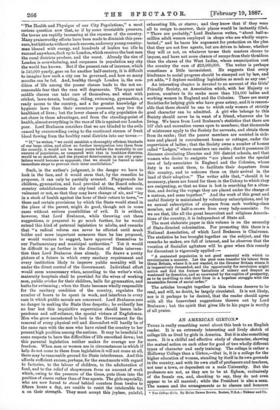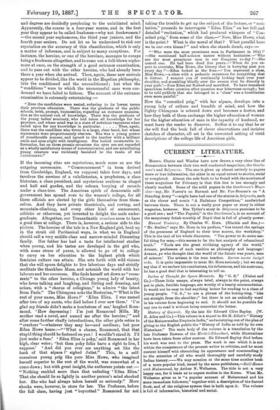AN AMERICAN GIRTON.*
Tama is really something novel about this book to an English reader. It is an extremely interesting and lively sketch of college life as lived by girls in America. But it is also something more. It is a skilful and effective study of character, showing the mutual action on each other for good of two wholly different types of character and early training. The college is rather a Holloway College than a Girton,—that is, it is a college for the higher education of women, standing by itself in its own grounds in the country, and with its own staff of professors and teachers, not near a town, or dependent on a male University. But the professors are not, as they are to be at Egham, exclusively of the female sex, and, shocking to say, they do not even appear to be all married ; while the President is also a man. The names and the arrangements as to classes and honours • Two Colkqe Girl,. By He:en Dawes Brown. Boston, U.S.A.: Ticknor and Co. and degrees are decidedly perplexing to the uninitiated mind. Apparently, the course is a four-year course, and in the first year they appear to be called freshmen—why not freshwomen ? —the second year sophomores, the third year juniors, and the fourth year seniors. Do not let us be understood to risk our reputation on the accuracy of this classification, which is only a matter of inference, and is subject to many exceptions. For instance, the heroine, or one of the heroines, manages to escape being a freshman altogether, and to come out a full-blown sopho- more at once, on the strength of a good entrance examination, and to pass out with the other heroine, who had already been there a year when she arrived. Then, again, these new arrivals appear to be divided, like the world in the Hegelian philosophy, into the conditioned and the unconditioned ; but what the "conditions" were to which the unsuccessful ones were con- demned we have failed to fathom. The account of the entrance examination is extremely entertaining :— "Here the candidates were seated, redwing to its lowest terms their previous education. There WBB the graduate of the public schools, brisk, prompt, businesslike, regarding an entrance examina- tion as the natural exit of knowledge. There was the graduate of the young ladies' seminary, who bad taken all knowledge for her province, and whose mind was in a state of nebulous vagueness when
called upon for any knowledge in particular Then, again, there was the candidate who wrote in a large, clear hand, but whose statements were proportionately obscure. She was a young person of considerable manner, and turned to the teacher with a brilliant smile and eyes alight with intelligence. She looked unutterable in- formation, but on these prosaic occasions the eyes are not regarded as a wholly satisfactory means of communication, and our scintillating young creature was ruthlessly banished to the ranks of the
CONDITIONED?'
If the incoming rites are mysterious, much more no are the outgoing ceremonies. "Commencement" (a term derived from Cambridge, England, we suppose) takes four days, and involves the services of a valedictorian, a prophetess, a class historian, a class president, and mysterious orations in chapel and hall and garden, and the solemn burying of records under a class-tree. The American spirit of democratic self- government has spread even to the women's college, for all these officials are elected by the girls themselves from them- selves. And they have private theatricals, and rowing, and mountain-climbing, and every other kind of amusement, athletic or otherwise, yet invented to delight the male under- graduate. Altogether, our Transatlantic cousines seem to have a good time at college. There is, however, a serious side to the picture. The heroine of the tale is a New England girl, bred up in the strait old Puritanical ways, in what we in England should call a very middle-class and narrow-minded Dissenting family. Her father has had a taste for intellectual studies when young, and his tastes are developed in the girl who, with some stress of purse, is allowed to go off to college to carry on her education to the highest pitch which feminine culture can attain. She sets forth with wild visions that she will spurn delights to live laborious days and strictly meditate the thankless Muse, and astonish the world with her labours and her successes. She finds herself set down as" room- mate" to the other heroine, a Chicago young lady of beauty, who loves talking and laughing, and flirting and dressing, and arises, with a "chorus of collegians," to admire "the latest from Paris." The Chicagoan asks the Bostonian," What is the rest of your name, Miss Howe?" Edna Eliza. I was named after two of my aunts, who died before I ever saw them.' Pm glad my friends didn't make a tombstone of me,' laughed Rosa- mond. 'How depressing ! I'm just Rosamond Mills. My mother read a novel, and named me after the heroine ;" and after some further chaffy introductions, the other girls retire to "crackers "—whatever they may be—and sardines ; but poor Edna Howe hears :—"'What a shame, Rosamond, that that -stupid thing should be fastened on you! I wouldn't stand it. I'd just make a fuss.' 'Edna Eliza is poky,' said Rosamond in her high, clear voice ; 'butt then poky folks have a right to live, I suppose.' 'And did you ever see anything set like the back of that alpaca ?' sighed Juliet." This, to a self- conscious young prig like poor Miss Howe, who imagined herself superior to the rest of the world, was somewhat of a come-down; but with great insight, the authoress points out "Nothing rankled more than that unfeeling Edna Eliza.' 'That she should lie so lightly in another person's mind shocked her. She who had always taken herself so seriously." More shocks were, however, in store for her. The Professor, before the fall class, having just " boycotted " Rosamond for not taking the trouble to get up the subject of the lecture, or "reci- tation," proceeds to interrogate "Edna Eliza" on her full and detailed "recitation," which had produced whispers of " Con- ceited prig," from some of the class.—"Now, Miss Howe, what is the point What is the moral of that ? What parallel have we in our own times ? " and when she stands dumb, says
Who were the most prominent men in Parliament in 1645 r —She mentioned half-a-dozen names without hesitation.—' Who are the most prominent men in our Congress to-day r—She named one. He had been dead five years.—' When do you ex- pect to overtake, Miss Howe, the history that is hurrying past you every day P'—Edna looked at the You represent a ekes, Miss Howe,—a class with a pedantic reverence for everything that is distant. I suspect you of continually looking back over your shoulder, and stumbling blindly over the events that lie directly in your path!—Poor Edna sat flushed and mortified. To have remained speechless before question after question was bitterness enough; bat to be told publicly that she belonged to a class ' was a humiliation even more painful."
How the "conceited prig," with her alpaca, develops into a young lady of culture and breadth of mind, and how the flighty Chicagoan is sobered down and becomes a doctor, and how they both of them exchange the higher education of woman for the higher education of man in the capacity of husband, we must leave the reader to discover. Suffice it to say that he or she will find the book full of clever observations and incisive sketches of character, all set in the unwonted setting of vivid descriptions of the college life of American girls.



































 Previous page
Previous page